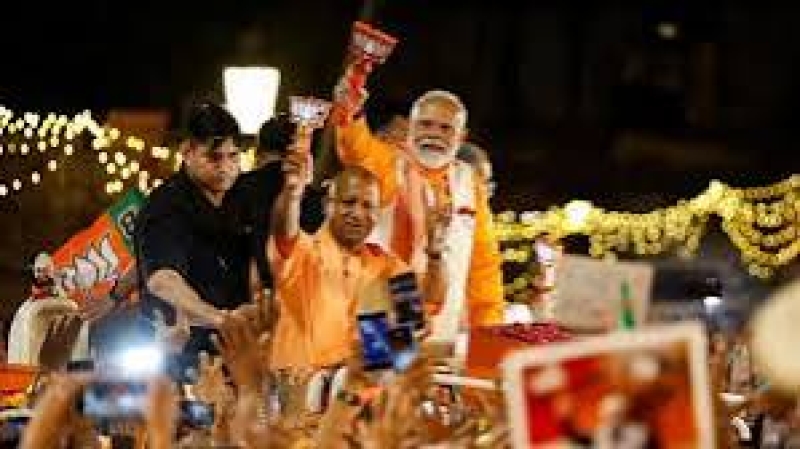- BNP govt to take office with economy at a crossroads |
- Pahela Falgun brings colour, music as spring begins |
- New MPs, cabinet members to be sworn in Tuesday |
- Mamata sends sweets, flowers to Tarique Rahman |
How Modi lost despite his win
Can Modi play friendly in the new coalition government despite his ‘moral defeat’?

The Bharatiya Janata Party (BJP), led by Narendra Modi for the past decade, will now have to be at the mercy of its alliance partners. Modi might now need to follow the principle of harmony as questions about the stability of the coalition government arise. Can Narendra Modi walk together with everyone?
India's 18th Lok Sabha election results are almost guarantee that Modi will have to partner with the centre. A minimum of 272 seats were required to form the government, out of which the BJP single-handedly won 240 seats. The NDA alliance led by them won 293 seats in total. Telugu Desam Party (TDP) chief Chandrababu Naidu and JD(U) president Nitish Kumar emerged as “significant” by winning 16 and 12 seats respectively.
There are reports coming from various sources that the alliance partners have already increased pressure on the BJP with the demands of various important offices. As a result, many people think that the “monopoly” of Modi's central government in India may be broken.
But even after all this, Modi is about to start his third innings as prime minister, defying a decade of anti-establishment winds. There is no leader comparable to his stature among the party and associates. Thus, Modi's influence is likely to remain intact. He is very experienced in these games, reports DT.
Analysts think that the legitimacy of the title of being the “world's largest democratic country” is returning to India. Modi's moral defeat is now even more evident. For the past decade Modi drove forward without a care as he had the backing of big corporations like Ambani, Tata, and Adani as well as a submissive media and a flattering bureaucratic administration. But now, India's rising unemployment, rising commodity prices, widening gap in inequality, caste politics, and religious divides have played a major role in Modi's loss of popularity. Defiance came in the face of fear among the people that BJP would change the constitution if it got a single majority. The BJP suffered its largest setback in India's big states, where it previously had the most number of Lok Sabha seats. Uttar Pradesh, Maharashtra, and West Bengal are among them.
The Congress party in India has also proved that it has not run out of steam. BJP has understood well that Congress has the capacity to claim power at any moment. And they may now be afraid their alliance might break. It remains to be seen how much charisma the BJP can show by standing on the mercy of its alliance partners.
While it is true that BJP's loss of the single majority has been a shock, the BJP is not yet dead
While it is true that BJP's loss of the single majority has been a shock, the BJP is not yet dead. All this is temporary damage. The opposition and the India Alliance are so flourishing and they still cannot come to power by defeating Modi now. They should not forget that Modi is not so much a palm soldier, he knows well how to heal wounds.
Yet, the main strength of any government is numbers, BJP does not have enough numbers now. So it remains to be seen how tactfully they can retain their throne.
The people of India have seen Modi's “absolute” power for the past decade. Discussions have already begun in national politics on whether PM Modi and his office can maintain that authority while leading a coalition government for the first time. Many see Modi's lack of experience in coalition politics as a weakness.
However, many BJP leaders have repeatedly said that Modi has a “long shadow” behind all the important decisions of the central government during the BJP's previous tenure. There have been accusations against Modi keeping the ministers of the respective ministries practically in the dark. In particular, issues of defense and national security have been alleged to be avoided by concerned ministers on several occasions. In this case, the name of National Security Advisor Ajit Doval, who is known as Modi's “closer,” has inevitably come up. Although there are ministers in charge of various ministries on the books, a section of the party says that till now Modi has practically handled the burden of all the departments alone.
BJP's Atal Bihari Vajpayee government ran a coalition government with 24 parties which is rare in Indian history. Jyoti Bose government of West Bengal claims to be one of the most successful examples of coalition government management. In the current situation, there is a lot of discussion about the unconditional support of the NDA alliance parties to Modi. Meanwhile, the alliance partners have become desperate to achieve their own interests by various means.
Will Modi be able to implement his electoral promises? One Civil Code Act for All (Universal Civil Court), one country one vote, repeal of Article 370 to implement numerous such election promises. Political analysts see these implementations as almost impossible. On top of that are the CA bill, NRC, farmers' movement which will put more pressure on the new Modi government.
Modi's critics are now not the opposition but his own party's allies. Now it is to be seen how Narendra Modi handles this pressure. But after a long time, India has finally gotten a strong opposition, which is the strength of a multi-party democracy. Narendra Modi's political position in the coming days will depend on the implementation of his promises.
Prashanta Kumar Shill is a Media Educator and International Political Analyst. Email: vprashantcu@gmail.com

